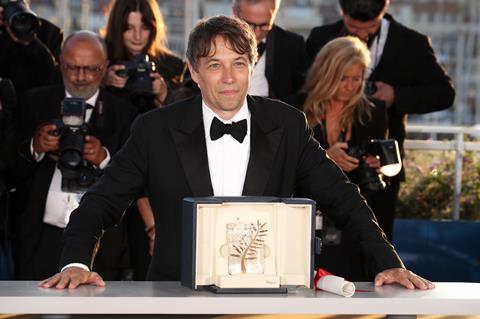
You know it’s a fun year when Sean Baker dedicates his Palme d’Or for Anora to sex workers everywhere. Or when Karla Sofia Gascon, the actress picking up the cast prize for Emilia Perez, expresses the hope it will help defeat anti-trans ‘cabrones’ (not translated for live French TV).
Sex and politics (including, but not only, the dignity of exiled director Mohammad Rasoulof’s impassioned plea for those imprisoned in Iran) is a potent blend, and Cannes 77 really hit the pulse button on it over 12 headline-hogging days.
For those searching for a trend, you could call the first part of the festival lively, youth-friendly, punchy, multiplex-adjacent: a jury prize-winning musical about a Mexican sex-change gangster from Jacques Audiard (Emilia Perez, with Netflix), a deranged feminist body-horror from Coralie Fargeat (The Substance, best screenplay, with Mubi), and the pumpingly potent hooker/mob Palme d’Or-winning drama from Sean Baker (Anora, with Neon).
By the time we got to the festival’s second act – Parthenope directed by Paolo Sorrentino, Motel Destino (Karim Aïnouz) and the Donald Trump origins story The Apprentice (Ali Abassi) – it was becoming clear that Cannes hadn’t seen this many boobs and bums and agents provocateurs since starlets used to strip for the paparazzi on the public beach. Sex sells, and if you look at the line-up, there’s a sense that Cannes 2024 was also selling itself.
Greta Gerwig’s jury gave some biz-friendly awards, which will make her even more popular. (Baker underscored his win on stage by emphatically endorsing theatrical distribution.) Jesse Plemons took best actor for Searchlight’s Kinds Of Kindness, opening soon. Elegant arthouse beauty Grand Tour from Miguel Gomes was awarded best director, while the elegiac Indian drama All We Imagine As Light by Payal Kapadia won the runner-up Grand Jury prize, no mean feat for a debut and the first Indian film to compete in 30 years. With Rasoulof’s The Seed Of The Sacred Fig – the second-to-last film to play – getting a special award, Gerwig also shared the pot.
All anyone could talk about going into the festival was whether Cannes 77 could top Cannes 76, which saw Anatomy Of A Fall and The Zone Of Interest duelling it all the way from Croisette to the Oscars. But Cannes is always canny. There are many ways to have a better festival. Critical consensus – if you can ever find it – indicates it was a good year, even if reviews were rarely rapturous. There are other titles in Competition that will clearly attract more specialised audiences: Magnus von Horn’s challenging The Girl With The Needle, Jia Zhangke’s Caught By The Tides. Andrea Arnold’s Bird will appeal to audiences at home in the UK.
Over 22 films, not every one can be a winner, and some weren’t even close. Where the festival stumbled most clearly was in its sentimental debt to the lions of the past: David Cronenberg’s The Shrouds, Paul Schrader’s Oh, Canada and Francis Ford Coppola’s grand folly Megalopolis, in particular. Sorrentino may only be 53 but Parthenope’s male gaze had the sweaty sheen of a dirty old man.
It was also a very poor year for French cinema: Christophe Honore’s Marcello Mio was a misfire, while Michel Hazanavicius’s Holocaust animation The Most Precious Of Cargoes was bizarrely misjudged and Gilles Lellouche’s epic Beating Hearts was a flat-lining flop. Three French films languishing at the bottom of Screen’s jury grid is a poor showing indeed: if it wasn’t for Fargeat with The Substance, shooting in English, and Agathe Reidinger with the underrated Wild Diamond, it would have been a domestic wipeout.
Hindsight is 20/20 of course. Last year’s attendees could clearly see the artistic value of Anatomy and Zone, but nobody could have predicted the commercial successes of a 150-minute French courtroom drama and a challenging, cerebral Holocaust film. So unpredictable things may yet happen. Kirill Serebrennikov’s taxing Limonov. The Ballad may strike a chord – Ben Whisaw’s performance is worth a view – although it seems unlikely. And Abbasi’s Trump drama The Apprentice could continue to draw attention if the US presidential hopeful keeps trying to sue it.
Outside of Competition, it was a year of consolidation. Un Certain Regard (UCR) solidified its reputation as the place to find new work, after years of confusion. Premiere, introduced as a section for directors who don’t want to compete, didn’t really lure enough of them – it was a shame to see Jessica Palud’s quietly confident Being Maria, about Maria Schneider, sitting there awkwardly. Out of Competition was the usual pick-and-mix of films about to open in France, studio blast-outs and curios that may or may not hit the seam but don’t really fit in other sections.
Down the Croisette, Critics’ Week knows exactly what it is doing and continues to do it. Directors’ Fortnight is probably the most challenging section in Cannes right now, with a confused sense of identity in the wake of UCR’s newfound strength.
People were generally happy, apart from Kelly Rowland. There were no demonstrations that significantly disrupted the event. The politics stayed attached to the films. The ticketing process even worked – and that’s a first in 77 years. From Iran to Trump to body horror and trans Mexican musicals, the festival was never out of the news cycle for its entire 12 days – and it never lost control of that news cycle either.
Cannes is a bizarre symbiosis of art and business and fashion and in the last few years a honeypot for global influencers and celebrity dogs. The festival keeps on getting bigger, dwarfing the town. It makes no sense. But somehow it still worked. Canny old Cannes indeed.






























No comments yet